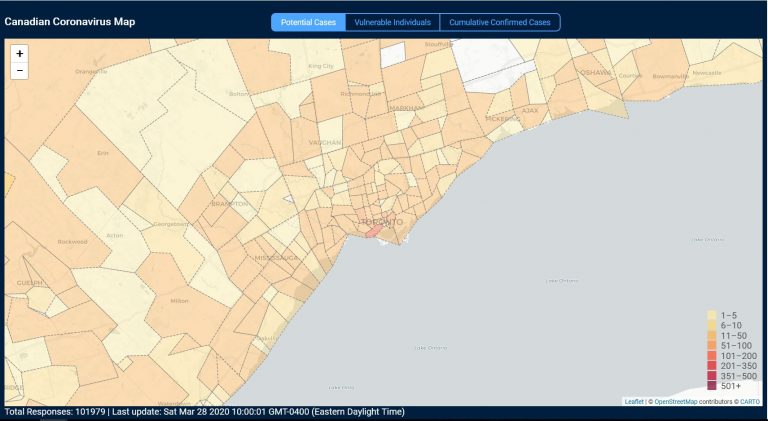
As governments around the world work hard to contain the coronavirus, a key ingredient is in short supply: detailed data on the presence of the virus in our communities. Without this information, public health agencies cannot accurately identify where localized efforts are needed most.
This is the gap that Year 1 EngSci student Shrey Jain and his colleagues are trying to fill. Jain leads a team of over 25 volunteer collaborators who sprang into action two weeks ago to create an online tool that develops a real-time heatmap of potential and confirmed COVID-19 cases.
Called FLATTEN.ca, the platform uses data analytics and information crowdsourced from users who anonymously self-report how they are feeling. The goal is to identify local outbreaks so that officials can see areas where resources will be in high demand.
The current goal is to gather data from 600,000 Toronto area residents—about ten percent of the population—to provide a more accurate picture of virus spread than is currently available. Google has offered to scale the project up to other regions across the country, if they succeed.
The FLATTEN team includes engineering, computer science and molecular genetics students from U of T, the University of Waterloo, the University of New Brunswick and McMaster University. Several U of T professors in fields from public health to computer science are among its advisors.
“The EngSci program and my friends in EngSci taught me what it really means to work hard on a daily basis,” says Jain, as the team continues their efforts in addition to their regular course work. Joining Jain on the team are EngSci students Martin Staadecker, Arthur Allshire, Rassam Yazdi (all Year 1), Hongyu (Charlie) Chen and Siyan Zhao (both Year 3 Machine Intelligence), and Jianing (Robert) Li and Lingkai Shen (both Year 4 Machine Intelligence).
“To all EngSci students who are involved in this project, I want to thank you for your efforts so far and encourage you to press on. The human race needs all the help it can get,” says Interim EngSci Chair, Professor Will Cluett.
Read how the team’s work is contributing to Canadian COVID-19 research in the Globe & Mail.